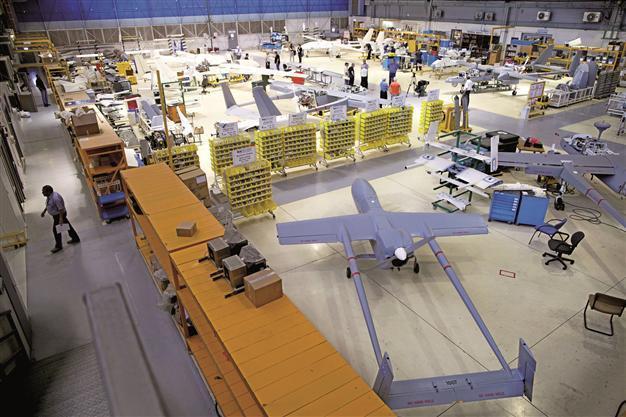Israel leads global drone exports as demand rises
BEN-GURION AIRPORT, Israel - The Associated Press

Drones are seen in a hangar at Israel Aerospace Industries. Israel has emerged as the world’s leading exporter of the aircraft, putting it in a key position. Global spending on the technology is expected to jump from an estimated $6.6 billion this year to $11.4 billion in 2022, according to the Teal Group. AP photo
In an expansive hangar in central Israel, workers toil on one of the world’s most contentious aircraft, fitting dozens of drones with advanced sensors, cameras and lasers before they are shipped to militaries worldwide to perform highly sensitive tasks.Whereas drones are often criticized elsewhere for being morally and legally objectionable, in Israel they are a source of pride. Israel - a pioneer of drone technology - has emerged as the world’s leading exporter of the aircraft and its accessories, putting it in a strong position as the industry continues to grow.
A report produced by U.S. consulting firm Frost & Sullivan determined earlier this year that Israel is now the largest exporter of unmanned aerial systems, surmounting aerospace giants in the U.S. The report said that from 2005 to 2012, Israel exported some $4.6 billion worth of systems, including aircraft, payloads, operating systems and command and control caravans. U.S. overseas sales for the same time period were between $2 and $3 billion, the report said.
Since Israeli drone makers do not release precise sales figures, the Israeli numbers are estimates based on the number of UAVs sold and the overall value of contracts that were announced during the seven-year period. Industry experts could not confirm the report’s numbers, but said Frost & Sullivan is a respected firm and its conclusions reflected Israel’s leading spot in the field.
Israel is well-positioned for the future. Analysts see demand for military UAVs quadrupling over the next decade, driven by their success in wars in Iraq and Afghanistan, where they have been used by Western forces to monitor and attack militants. Countries like Italy, Germany and South Africa, among others, also export their drones and dozens of others have started their own UAV programs.
Global spending on the technology is expected to jump from an estimated $6.6 billion this year to $11.4 billion in 2022, according to the Teal Group, which analyzes the aerospace industry. A fledgling civilian market is also expected to surge.
While the U.S. has faced criticism over the use of its drones in lethal missile attacks against militants, in Israel, they are being used in a growing number of operations.
Defense officials say that drones account for roughly half of the military’s flight time. Drones proved essential in Israel’s last two wars in the Gaza Strip, providing its troops eyes over its enemies in congested urban areas of the Palestinian territory, and are lauded for sparing dozens of soldiers’ lives. They also keep watch on neighboring Syria and Lebanon.
The Palestinians claim that Israeli drones, like their U.S. counterparts, can fire missiles and have carried out dozens of airstrikes that have killed civilians as well as militants. Israel does not say whether drones it uses can fire missiles, but foreign experts believe they can.
Export focus
Exported Israeli drones, on the other hand, are believed to be used for surveillance and not thought to have attack capabilities.
“The Israeli companies are very good and very advanced and very smart at making systems that function in a tactical environment because they’ve been at war constantly,” said Michael Blades, an industry analyst who authored the Frost & Sullivan report. “It came out of necessity but they got really good at it.”
Israel first made widespread use of drones during the 1982 Lebanon war, after developing the technology following failures in the 1973 Mideast war. During that conflict, the Israeli air force suffered heavy losses, and defense officials sought a solution that would allow them to identify anti-aircraft missile batteries before sending in fighter planes. Drones that could paint a picture of the battlefield in real time were created to meet that challenge.
Since then, Israeli companies, such as Israel Aerospace Industries, Elbit Systems and Aeronautics Defense Systems, have begun producing drones, selling them at first to Israel’s military, then branching out worldwide. Israeli drones have flown in conflict zones around the world, from Afghanistan to Mali. Britain and Brazil are among the biggest clients.
“We exist because of the international market,” said Shmuel Falik, who markets drones for state-owned IAI. “We’re too big for Israel, to our delight.” IAI, considered the leading Israeli unmanned aerial system exporter by Frost & Sullivan, sells drones to 49 customers worldwide and says 80 percent of its UAV products are destined for foreign markets.
Experts said Israeli companies benefit from a strong link with Israel’s army. Beyond that, drone manufacturers employ former soldiers, granting them a deeper understanding of a soldier’s needs.
















